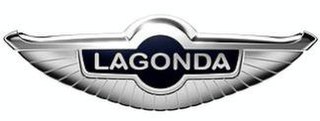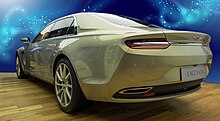Aston Martin Lagonda Global Holdings PLC is a British manufacturer of luxury sports cars and grand tourers. Its predecessor was founded in 1913 by Lionel Martin and Robert Bamford. Steered from 1947 by David Brown, it became associated with expensive grand touring cars in the 1950s and 1960s, and with the fictional character James Bond following his use of a DB5 model in the 1964 film Goldfinger. Their grand tourers and sports cars are regarded as a British cultural icon.

The Aston Martin Vanquish is a grand tourer introduced by British luxury automobile manufacturer Aston Martin in 2001 as a successor to the Aston Martin Virage (1993).

The Aston Martin DB9 is a two-door grand touring car produced by the British carmaker Aston Martin. Designed by Ian Callum and Henrik Fisker and produced between 2004 and 2016 in Gaydon, Warwickshire, the DB9 was available as both a coupe and a convertible, the latter known as the "Volante".

The Aston Martin Lagonda is a full-size luxury four-door saloon manufactured by British manufacturer Aston Martin between 1974 and 1990. A total of 645 were produced. The name was derived from the Lagonda marque that Aston Martin had purchased in 1947. There are two distinct generations: the original, the short-lived 1974 design based on a lengthened Aston Martin V8, and the entirely redesigned, wedge-shaped Series 2 model introduced in 1976.

Walter Owen Bentley, (16 September 1888 – 13 August 1971 was an English engineer who founded Bentley in London. He was a motorcycle and car racer as a young man. After making a name for himself as a designer of aircraft and automobile engines, Bentley established his own firm in 1919. He built the firm into one of the world's premier luxury and performance auto manufacturers, and led the marque to multiple victories at the 24 Hours of Le Mans. After selling his namesake company to Rolls-Royce in 1931, he was employed as a designer for Lagonda, Aston Martin and Armstrong Siddeley.

The Aston Martin DB5 is a British grand tourer (GT) produced by Aston Martin and designed by Italian coachbuilder Carrozzeria Touring Superleggera. Originally produced from 1963 to 1965, the DB5 was an evolution of the final series of DB4. The "DB" designation is from the initials of David Brown who built up the company from 1947 onwards.

The Aston Martin DB2 is a grand tourer that was sold by Aston Martin from May 1950 until April 1953. The successor to the 2-Litre Sports model, it had a comparatively advanced dual overhead cam 2.6 L Lagonda straight-6 engine in place of the previous overhead valve engine straight-four engine. It was available as a closed, 2-seater coupé which Aston Martin called a sports saloon, and later also as a drophead coupé, which accounted for a quarter of the model's total sales. The closed version had some success in racing.

Lagonda is a British luxury car brand established in 1906, which has been owned by Aston Martin since 1947. The trade-name has not had a continuous commercial existence, being dormant several times, most recently from 1995 to 2008, 2010 to 2013, and 2016 onward.

The DB4 is a grand tourer that was produced by Aston Martin from 1958 until 1963. The "DB" designation came from Sir David Brown, who built up the company from 1947 onwards.

The Lagonda Rapide is a hand built full-sized luxury four-door grand tourer which was produced by Aston-Martin from 1961 until 1964.

The Aston Martin Virage is an automobile produced by British luxury automobile manufacturer Aston Martin as a replacement for its V8 models. Introduced at the Birmingham Motor Show in 1988, it was joined by the high-performance Vantage in 1993, after which the name of the base model was changed to V8 Coupe in 1996.

The Aston Martin Rapide is an executive saloon car produced from 2010 until 2020 by the British carmaker Aston Martin. Aston Martin began developing the Rapide in 2005—the first series produced, four-door automobile from the company. The initial design was completed in about seven weeks by Marek Reichman. After more than four months of development, a prototype was completed and displayed at the 2006 North American International Auto Show. The production version of the Rapide debuted at the 2009 International Motor Show Germany, and official manufacture began in May 2010 at the Magna Steyr facility in Graz, Austria.

The Lagonda 3-Litre is an automobile which was produced by Aston Martin Lagonda from 1953 until 1958. It was the second Lagonda model of the David Brown/Aston Martin era. The 3-Litre was fitted with a higher displacement 2.9 L 140 bhp version of the twin overhead camshaft Lagonda Straight-6 engine designed by Walter Owen Bentley.
A land yacht is an informal category of large automobiles. While full-size cars are manufactured worldwide to this day, the term is most often used to describe the full-size cars of American origin between 1960 and 1976.

Andrew Charles Palmer is an English automotive executive and engineer. He has been described as the 'Godfather of EVs' due to his work launching the Nissan Leaf in 2010 whilst COO at the Japanese company. Palmer is also known for launching Aston Martin's first SUV, the DBX, and first mid-engined sports car, Valkyrie, during his tenure as CEO from 2014 to 2020. Palmer was previously CEO and Executive Vice-chairman of electric bus and van company, Switch. He resigned from this role in 2022. Palmer was appointed Interim CEO of PodPoint in July 2023.

The Aston Martin Rapide Bertone Jet 2+2 is a one-off shooting brake designed by car enthusiast Barry Weir and the last ever vehicle to be built by car maker Bertone. It was shown at the 2013 Geneva Motor Show.

The Aston Martin DBX is a crossover SUV produced by British luxury car marque Aston Martin since 2020. It is the first SUV the company has made. It has been described as both a "full-sized" and as a "mid-sized" vehicle.

Aston Martin has made a number of mechanically similar V8 engines over the years, since the first one used in the Aston Martin V8 in 1969. They have been both naturally-aspirated and supercharged.



















